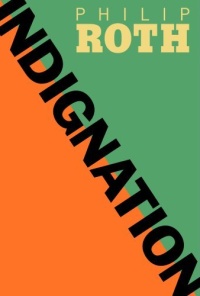Review: 'Indignation' by Philip Roth
 Philip Roth's Indignation describes the short unhappy life of Marcus Messner, a college student in the early '50s who is paranoid about getting kicked out of school and drafted to serve in the Korean War, in spite of the fact that his grades are so strong he could become valedictorian. Messner, the dutiful son of a kosher butcher in Newark, transfers from a local school to Winesburg College in Ohio, trying to escape an overprotective father who has become overwhelmed by fear that his son will die.
Philip Roth's Indignation describes the short unhappy life of Marcus Messner, a college student in the early '50s who is paranoid about getting kicked out of school and drafted to serve in the Korean War, in spite of the fact that his grades are so strong he could become valedictorian. Messner, the dutiful son of a kosher butcher in Newark, transfers from a local school to Winesburg College in Ohio, trying to escape an overprotective father who has become overwhelmed by fear that his son will die.
Messner's a mess, a bundle of unexpressed antisocial rage who can't get along with his roommates, rejects numerous invitations to socialize with classmates and can't seem to take joy from anything -- not even his first sexual relationship, which falls into his lap in a classmate's 1940 LaSalle Touring Sedan.
I've never read Roth before, but the way he writes sex in Indignation reminded me of the 40-Year-Old Virgin bluffing his way through a discussion of sexual conquest among male friends by talking about "bags of sand."
Sex figures heavily into Messner's story -- excruciatingly bad sex, both in execution and description. Anyone suffering from "prolonged excitation" can cure the problem by reading the sex scenes in this book.
Indignation picks up when it covers the rest of Messner's life, where his Bertrand Russell-inspired atheism causes him to rebel against the requirement that all Winesburg students attend chapel. A prolonged argument between Messner and the Dean of Men -- where Messner schools the dean on Russell's famous 1927 lecture "Why I Am Not a Christian" -- drives the remainder of the book towards a conclusion you know will be tragic for the student. I found the setting of Winesburg, which Roth copped from Sherwood Anderson's Winesburg, Ohio, a pleasant reminder of the way a college can be a world unto itself.
Unfortunately, just when you think the story's going somewhere, the small-page, big-font, 233-page book abruptly ends. Roth constructs a plot device in which he can stop Messner's story at any time, and he does, cutting it off before the crisis that leads Messner to leave school. He never justifies how the young man, who believes that leaving college means certain doom in Korea, throws away his academic career. He never shows you how Messner's father reacts to the thing he most feared, the notion that in life, "the tiniest misstep can have tragic consequences."
Instead, you get a seven-page wrap up zooming through all the events you missed because the book ended too soon. Talk about indignation.
Add a Comment
All comments are moderated before publication. These HTML tags are permitted: <p>, <b>, <i>, <a>, and <blockquote>. This site is protected by reCAPTCHA (for which the Google Privacy Policy and Terms of Service apply).

